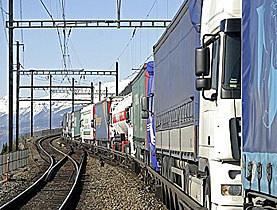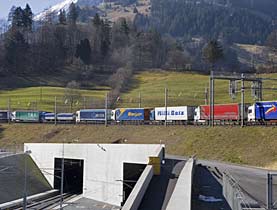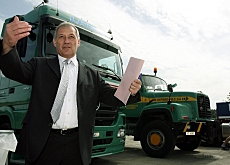Veto on truck tax throws spanner into EU deal

A decision by a Swiss court to annul an increase in road freight tax for heavy goods vehicles has been criticised by the transport ministry and environmental groups.
The levy is part of a compromise agreement with the European Union which allowed 40-tonne lorries on Swiss roads. Some worry the country’s policy of moving transalpine freight traffic from road to rail could be jeopardized by the ruling.
The Federal Administrative Court upheld a complaint by the Swiss Road Hauliers’ Association against the government’s 2008 decision to raise the tax to a maximum of SFr325 ($319) per year. It had objected to the hike over the way it was calculated.
Politicians have been quick to condemn the court’s decision as going against Swiss transport policy. The ruling will result in SFr150 million shortfall in revenue for upgrading the country’s rail network, according to Peter Bieri, speaker for the Senate’s transport committee.
“It could slow down the transition of road to rail as well as cause uncertainty over the agreement with the EU and a transport policy which is seen as exemplary,” he said.
Switzerland might be facing a repetition of difficult negotiations with Brussels over freight limits and tariffs if the supreme court confirms last week’s ruling, Bieri added.
The environmental organisation, the Alpine Initiative, said that the tax, including having a maximum levy, was part of a compromise deal with the EU. It helped win a majority of voters over to the bilateral transport accord with the EU in May 2000.
Renegotiations?
“Logically the freight limit would have to be renegotiated if the tariffs have to be lowered,” said the initiative’s director, Alf Arnold.
His group was behind an amendment to the Swiss constitution to move heavy goods from road to rail, which was accepted in a nationwide ballot 15 years ago.
However, Arnold says it is not realistic to expect Brussels to agree to any renegotiations. “The alternative is to push the Alpine Crossing Exchange system to keep on with our road to rail transport policy.”
This proposal includes a quota on transalpine freight, allowing haulage companies to purchase credits for their journeys.
Transport Minister Moritz Leuenberger said he was disappointed by the court ruling, also for reasons of democracy. The maximum tax rate was allowed under law and had been approved by voters, he said.
Leuenberger added that negotiations with the EU had been very tough and that there was pressure from Swiss voters to raise the tariff even more.
“No doubt the ruling is a setback for our policy, but the government will most likely appeal against it,” he said.
Illegal
However, the road hauliers do not rate an appeal’s chances as very high.
The association said the administrative court was breaking new ground and that the verdict showed that the government had acted arbitrarily when it increased the tariffs for 2008.
Its president, Adrian Amstutz, said that the implementation of the tax rise went against the law. He said that the gains from the new tariff were higher than the costs caused by heavy goods traffic.
Amstutz said his organisation had been forced to make a “scandalously huge effort” to fight against the tax hike.
Individual members of the association had lodged thousands of complaints with the tax authorities.
Urs Geiser and Corinne Buchser, swissinfo.ch
Cars using Swiss motorways need special road toll stickers. Vehicles above 3.5 tonnes have to pay a heavy goods tax for all roads.
The levy was introduced in 1994 following a nationwide vote and was adapted in 1998. The amount owed is mileage-based.
The tax is also part of bilateral transport agreement between Switzerland and the EU which came into force in 2002.
There are three north-south routes to cross the Swiss Alps. The Gotthard tunnel is the artery. The others are the Simplon route in the west of the country as well as the San Bernardino in eastern Switzerland.
The authorities have decided with immediate effect to tax foreign trucks according to old tariffs.
Swiss transport policy calls for most goods transport to be taken off the road and put on trains.
The number of trucks transiting Switzerland is supposed to drop to 650,000 by 2018-2019 (one million in 2011).
Last year parliament decided to delay the initial target date of 2009 by ten years.
Presently about 1.3 million trucks per year pass through the Swiss Alps. However, rail freight traffic dropped by nearly 25% in the first half of 2009.
Last year the government set the annual maximum heavy good levy at SFr325 based on controversial calculations of the cost of traffic.

In compliance with the JTI standards
More: SWI swissinfo.ch certified by the Journalism Trust Initiative















You can find an overview of ongoing debates with our journalists here . Please join us!
If you want to start a conversation about a topic raised in this article or want to report factual errors, email us at english@swissinfo.ch.